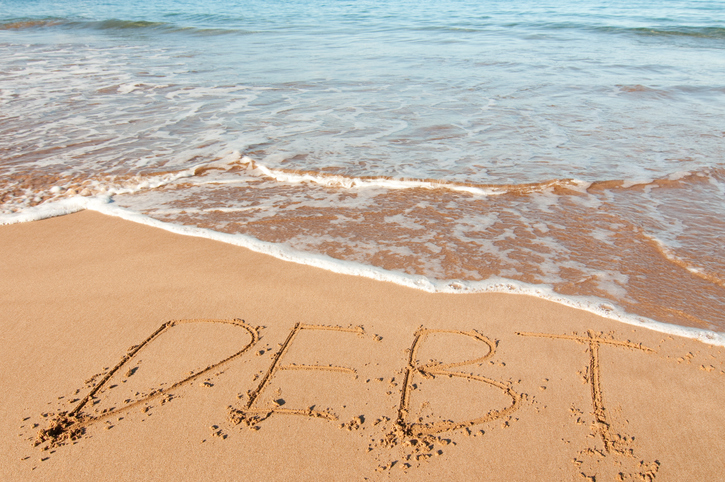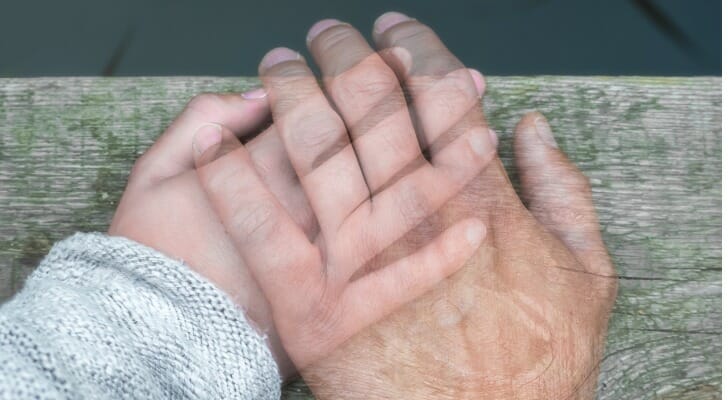Losing a spouse can be an emotionally challenging time. It can often be accompanied by financial concerns, as well, especially if they leave behind credit card debt, loans or other obligations. You might wonder, “Am I responsible for my deceased spouse’s debt?” Generally, the answer is no; you’re typically not required to cover someone else’s debts. However, there are certain situations where exceptions may apply. Consulting with a financial advisor can help you understand which financial responsibilities are yours, and provide guidance on managing them effectively.
Am I Responsible for My Deceased Spouse’s Debt?
Again, the answer to this question is most often “no.” Family members, including spouses, are generally not responsible for paying off the debts of their deceased relatives. That includes credit card debts, student loans, car loans, mortgages or business loans.
Instead, any outstanding debts would be paid out from the deceased person’s estate. What that means for you as a surviving spouse is that you wouldn’t be obligated to pay anything personally toward the debt. But your spouse’s assets could be tapped to cover loans or other debts they’ve left behind.
A debt collector can, however, reach out to you following your spouse’s death to confirm who they should contact about debt repayment. Typically, this would be the executor of the estate. If your spouse had a will, they may have named their executor in that document. Otherwise, you could petition the probate court to become their executor once they pass away.
A key part of the executor’s role is to inventory the deceased person’s assets, estimate their value, notify creditors of their death and pay any lingering debts. When no cash resources, such as a bank account, are available, the executor can liquidate assets to pay off creditors.
When a Surviving Spouse Is Responsible for Paying Debts
Most of the time, you wouldn’t be required to pay a deceased spouse’s debts directly from your personal assets. But it’s possible that you may have to pay debts left by your spouse if:
- They’re jointly owed. If you cosigned a loan with your spouse or you’re listed as a joint account holder on a credit card, then legally, you’re equally responsible for the debt. In that case, the death of your spouse wouldn’t eliminate your obligation to pay any remaining balance on the debt.
- You live in a community property state. Community property laws make both spouses equally responsible for debts incurred during the marriage. So even if your spouse leaves behind a debt that was owed in their name only, you could still have to pay it if you live in a community property state.
- State law requires you to pay. You may have to pay certain debts incurred by your deceased spouse if it’s mandated by state law. For example, you may have to pay their outstanding medical bills after your spouse’s death.
It’s important to note that with credit card debts, there’s a distinction between joint account holders and authorized users. As a joint account holder, you and your spouse are both considered owners of the account. That means you share equally in the ownership of any debt that accrues on the card.
Authorized user status, on the other hand, means that you have charge privileges on your spouse’s card. But you’re not considered an account owner. If your spouse were to pass away, as an authorized user you wouldn’t be responsible for paying the debt. The exception would be if you lived in a community property state.
Can You Be Sued for a Deceased Spouse’s Debt?

When a deceased spouse leaves behind debt, it’s possible debt collectors could attempt to sue you to recover what’s owed. Whether these efforts are successful hinges on whether you can, in fact, be held responsible for the debt. In the case of jointly owned debts or debts in community property states, it’s possible a debt collector could file a small claims case to collect any remaining balance owed.
If you’re sued, the debt collector would first have to win a judgment before additional collection actions, such as garnishing your wages or levying your bank accounts, could be pursued.
If you’re sued for a debt that you aren’t legally responsible for, you may want to talk to an attorney about what to do next. Ignoring the filing and missing the court date could result in a default judgment being filed against you. An attorney can help you prepare a response to the lawsuit and organize supporting documentation to show that you can’t legally be sued for the debt.
Planning Ahead to Avoid Spousal Debt
Finding out that you’re responsible for a deceased spouse’s debt or that their estate will be tapped to pay their debts can be an unpleasant surprise. Incorporating debt repayment measures into your financial plan can help ensure that neither of you is left holding the bag for unpaid bills if the other passes away.
For example, your financial plan should include which debts you’re responsible for individually and jointly. It may be helpful to create an inventory of your debts, including who owes what, to which creditor and the amount that’s owed.
From there, you can create contingencies for paying those debts off if one of you passes away. For instance, purchasing a life insurance policy for each of you means the surviving spouse will have money to pay off debts, cover funeral expenses or pay any other necessary expenses without feeling financially burdened.
It’s also helpful to check who your beneficiaries are for things like a 401(k) or individual retirement accounts. These types of accounts are generally insulated against debt collection efforts. So naming one another as your beneficiaries could offer some protection for those assets. You also might consider transferring some or all of your assets to a trust. This can also put them out of reach of debt collectors.
How State Laws Can Affect Spousal Debt After Death
Whether you are responsible for a deceased spouse’s debt can depend heavily on the state where you live. States generally fall into two categories: community property states and common law states. These systems treat marital debt differently, and that difference can determine whether you may be on the hook for what your spouse owed.
In common law states, debts usually remain the responsibility of the individual whose name is on the account. If your spouse had a credit card or loan only in their name, you would not be personally responsible for it after their death. The estate would be used to pay what is owed. Only debts that you cosigned or accounts you jointly owned would remain your responsibility.
In community property states, debts incurred during the marriage are treated as belonging to both spouses. That means even if your spouse’s name alone was on a loan, you may still be responsible for it because the law views the debt as shared. Community property rules apply in states such as California, Texas, Arizona, and a handful of others. Knowing whether your state follows these rules is important when planning your finances.
State law can also affect specific types of debts. Some states have “necessaries” statutes that may hold a surviving spouse responsible for medical bills, nursing home care or funeral expenses. Even if you were not a cosigner or joint owner, these state rules could create liability. Laws differ widely, so the impact of a spouse’s death on outstanding medical or personal debts can vary.
Because of these differences, it’s important to look at both federal protections and state-specific rules. A surviving spouse in one state may have no personal liability, while someone in another state may face substantial obligations. Checking your state’s laws, reviewing estate documents and consulting with an attorney can help you understand where you stand and how to prepare.
Bottom Line

Spousal debt responsibility after death is an important topic for couples to address because it can have lasting financial effects. If one spouse dies with outstanding debts, responsibility for repayment depends on the type of debt, whose name is on the account, and the laws of the state. Understanding these factors can help you prepare for how debts might be handled and how they could affect your finances.
“All married couples should discuss their debts with each other to get clear on individual and shared responsibilities. Check your state’s laws on debt repayment after death so you can plan accordingly,” said Tanza Loudenback, a Certified Financial Planner™ (CFP®). “Meeting with an estate planning attorney can also help clarify your legal obligations and guide you in protecting your financial interests.”
Tips for Handling Debt
- Consider talking to a financial advisor about how debt might affect your overall financial plan and goals. If you don’t have a financial advisor yet, finding one doesn’t have to be hard. SmartAsset’s free tool matches you with vetted financial advisors who serve your area, and you can have a free introductory call with your advisor matches to decide which one you feel is right for you. If you’re ready to find an advisor who can help you achieve your financial goals, get started now.
- If you end up having to pay someone else’s credit card debt a free easy-to-use credit card debt calculator can simplify your task. Also, if you and your spouse are struggling with credit card balances or other types of debt, talking to a certified credit counselor may help.
Tanza Loudenback, a Certified Financial Planner™ (CFP®), provided the quotes used in this article. Please note that Tanza is not a participant in SmartAsset AMP, is not an employee of SmartAsset and has been compensated. The opinions voiced in the quote(s) are for general information only and are not intended to provide specific advice or recommendations.
Photo credit: ©iStock.com/Ralf Geithe, ©iStock.com/400tmax, ©iStock.com/AntonioGuillem
